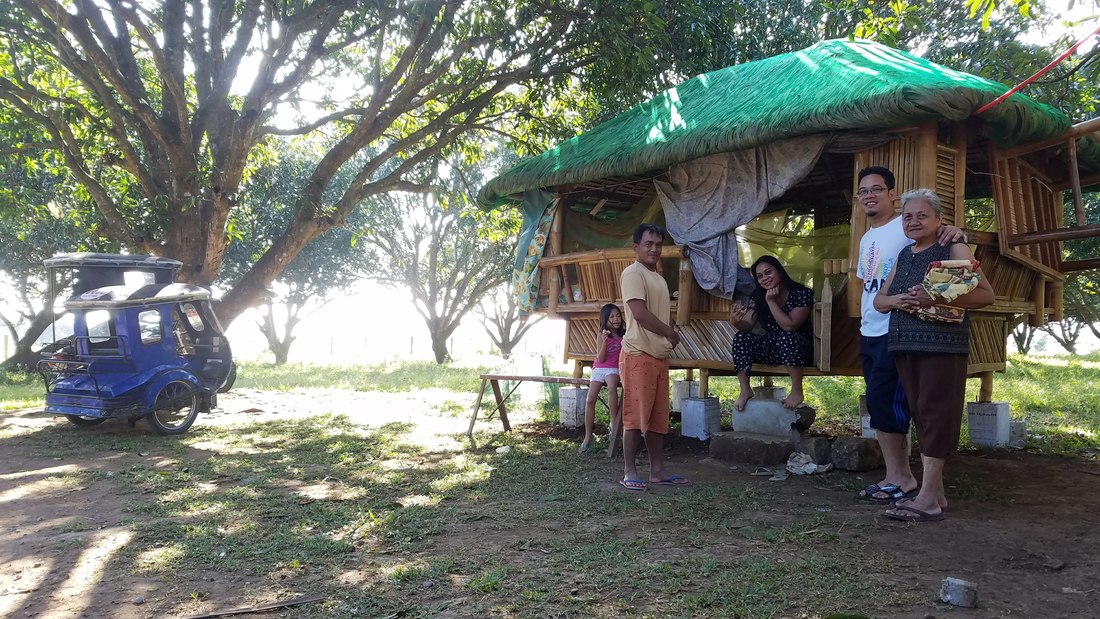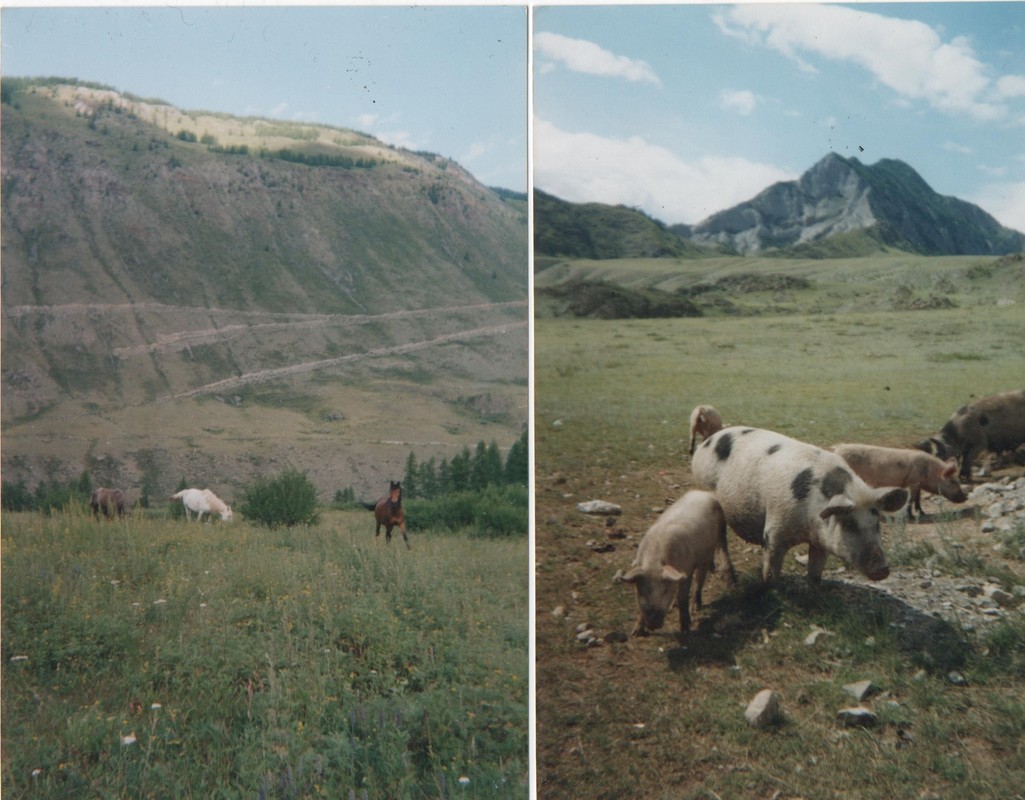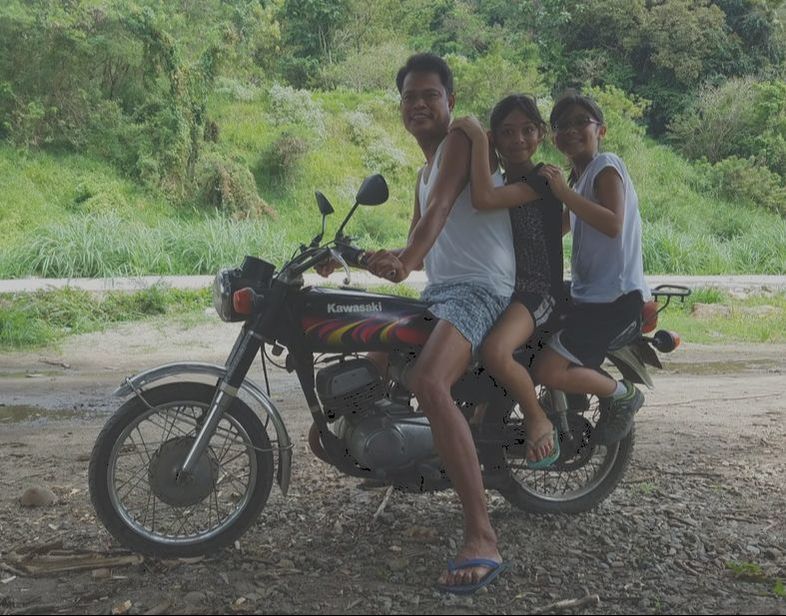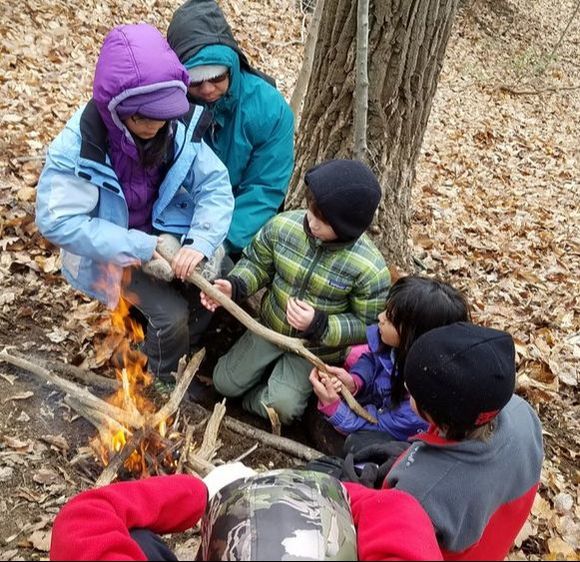Having spent a month in the Philippines recently, I'll be honest: I appreciate the luxuries that are standard fair in America. Flush toilets, potable tap water, air conditioning, and free internet at local cafes, to name a few.
That said, I loved being in the Philippines despite the lack of amenities. Warm, friendly, joyful people cheered my heart in a way that I rarely encounter living here.
Conversely, it seems common for people in the wealthy West to go through life with a severe joy deficiency, mired in anxiety or other negative emotions. A high standard of living is no guarantee of a rich experience of life.
Furthermore, some of my most powerful peak experiences have taken place outdoors, on the tattered edge of existence, as in the following story.
When I was a younger man, I traveled to Russia one summer for some backpacking and a river trip in the Altai Mountains.
After three or four straight days and nights on the trans-Siberian railroad we finally arrived at our first camp, near the banks of the Chuya, a swift, narrow mountain river with some big rapids.
When all had turned in for the night, I remained sitting restless and lonely by the campfire in my thermal long-johns and t-shirt, not knowing what to do with myself.
Across the river and a small bridge from our camp, a distinctly pyramid-shaped hill loomed in the night. I could see it more by memory in the dark, than by sight. Impulsively, I decided to go climb it, just for the heck of it.
That said, I loved being in the Philippines despite the lack of amenities. Warm, friendly, joyful people cheered my heart in a way that I rarely encounter living here.
Conversely, it seems common for people in the wealthy West to go through life with a severe joy deficiency, mired in anxiety or other negative emotions. A high standard of living is no guarantee of a rich experience of life.
Furthermore, some of my most powerful peak experiences have taken place outdoors, on the tattered edge of existence, as in the following story.
When I was a younger man, I traveled to Russia one summer for some backpacking and a river trip in the Altai Mountains.
After three or four straight days and nights on the trans-Siberian railroad we finally arrived at our first camp, near the banks of the Chuya, a swift, narrow mountain river with some big rapids.
When all had turned in for the night, I remained sitting restless and lonely by the campfire in my thermal long-johns and t-shirt, not knowing what to do with myself.
Across the river and a small bridge from our camp, a distinctly pyramid-shaped hill loomed in the night. I could see it more by memory in the dark, than by sight. Impulsively, I decided to go climb it, just for the heck of it.
At first the going was easy enough, to walk if not to run. Soft dirt dotted with tufts of grass and small shrubs - something like the Mojave desert in southern Nevada or Utah.
The slope grew steeper and rockier, and soon I could only scramble. And the scrambling required ever more care.
I had the agility and balance of a skilled rock climber, which allowed me to go farther than I should have, delicately ascending an outcrop of loose rock with no rope or partner. It was on this ledge that my sense finally caught up with me.
I realized that to continue would be madness. To down-climb in the dark -- still more so.
If only the moon would rise, I thought, perhaps it would illuminate a way out of my predicament. I couldn't remember what phase it was in though, if it would even rise that night. Sparse cloud-cover revealed some stars, but not enough for me to find Polaris and get my bearings, to determine if moonlight was a possibility on my side of the hill, should that satellite even rise.
I was lucky it was not colder or windier than it was, but the heat of my ascent was dissipating, and the chill of the night catching up to me. I anticipated the shivering that would gradually ensue if I remained through the night.
Worry, fear, and uncertainty gripped me. I don't know how long I sat there. I know that at times I cried and at times I prayed for deliverance.
And then, the dark clouds of my mind dissipated. I felt a strange calm confidence to move forward, to climb onward, into the night, to face the slope above me.
Moving on all fours, I began to feel like a mountain goat; trying to maximize the weight on my hands for better grip. I used little tufts of grass as holds. The whole time I was at once completely focused on the climb, and overwhelmingly grateful with every step and movement to be alive and whole.
If any rock or grass tuft had given way, it would have been a long tumble down, survival uncertain. Failure was not an option.
Emerging at the top ... I've never felt a deeper sense of gratitude for being alive, before or since.
Perhaps we appreciate life more fully against the backdrop of felt risk.
In rural parts of the Philippines we would occasionally see an entire family sharing a motorcycle - baby on board and no helmets. Living in poverty, every bite of food, every thing that goes right, can be appreciated all the more keenly against the ever-present backdrop of one's vulnerability. When tomorrow is deeply uncertain, it can give one a deeper appreciation for the present moment.
The slope grew steeper and rockier, and soon I could only scramble. And the scrambling required ever more care.
I had the agility and balance of a skilled rock climber, which allowed me to go farther than I should have, delicately ascending an outcrop of loose rock with no rope or partner. It was on this ledge that my sense finally caught up with me.
I realized that to continue would be madness. To down-climb in the dark -- still more so.
If only the moon would rise, I thought, perhaps it would illuminate a way out of my predicament. I couldn't remember what phase it was in though, if it would even rise that night. Sparse cloud-cover revealed some stars, but not enough for me to find Polaris and get my bearings, to determine if moonlight was a possibility on my side of the hill, should that satellite even rise.
I was lucky it was not colder or windier than it was, but the heat of my ascent was dissipating, and the chill of the night catching up to me. I anticipated the shivering that would gradually ensue if I remained through the night.
Worry, fear, and uncertainty gripped me. I don't know how long I sat there. I know that at times I cried and at times I prayed for deliverance.
And then, the dark clouds of my mind dissipated. I felt a strange calm confidence to move forward, to climb onward, into the night, to face the slope above me.
Moving on all fours, I began to feel like a mountain goat; trying to maximize the weight on my hands for better grip. I used little tufts of grass as holds. The whole time I was at once completely focused on the climb, and overwhelmingly grateful with every step and movement to be alive and whole.
If any rock or grass tuft had given way, it would have been a long tumble down, survival uncertain. Failure was not an option.
Emerging at the top ... I've never felt a deeper sense of gratitude for being alive, before or since.
Perhaps we appreciate life more fully against the backdrop of felt risk.
In rural parts of the Philippines we would occasionally see an entire family sharing a motorcycle - baby on board and no helmets. Living in poverty, every bite of food, every thing that goes right, can be appreciated all the more keenly against the ever-present backdrop of one's vulnerability. When tomorrow is deeply uncertain, it can give one a deeper appreciation for the present moment.
I don't mean to romanticize poverty, by any stretch. Nor do I believe that this dynamic is true for all. People can choose to see life with gratitude, but also with bitterness, and the latter can be exaggerated grotesquely by hardship -- as Victor Hugo illustrated with the Thenardiers (the inn keepers that raised Cosette) in Les Miserables. Substance abuse, disease, brutal stress and cruelty afflict all too many poor households.
All the same, when we strip life down to its bare bones, when we experience extremes of hunger and thirst, of heat and cold; and when we venture into the unknown and take risks, we can also discover and develop a resilient inner core of our being that might otherwise remain unfamiliar.
At Natural Leaders, we give participants the opportunity to taste nature in all it's seasons, and through all senses. Students take risks: balancing on logs over water, using sharp implements, wading in streams, lighting fires and leading activities.
They might get wet, thirsty, cold. Sometimes a student might get a cut, scrape or bruise. But in the aftermath of navigating risks and weathering shocks, students have the embodied knowledge of their own toughness and resilience.
By contrast, when we over-protect and insulate ourselves, and young people especially, we lose that proof of our resilience. This can allow anxiety to creep in and fill the void, and limit our ability to even set goals, much less pursue them.
But mastering the natural environment is only the first step. It is important to us that students can apply the survivor mindset of alertness, gratitude, grit and resilience in daily life too.
To that end Natural Leaders are placed in roles where they present topics, teach students, write reports to parents, present stories, plan and lead our daily schedules.
We support and guide students in performing these roles, and debrief the valuable lessons that they bring to light. In this way, students systematically confront and learn to navigate the wilderness and social realm alike, to survive and thrive wherever and how they choose.
All the same, when we strip life down to its bare bones, when we experience extremes of hunger and thirst, of heat and cold; and when we venture into the unknown and take risks, we can also discover and develop a resilient inner core of our being that might otherwise remain unfamiliar.
At Natural Leaders, we give participants the opportunity to taste nature in all it's seasons, and through all senses. Students take risks: balancing on logs over water, using sharp implements, wading in streams, lighting fires and leading activities.
They might get wet, thirsty, cold. Sometimes a student might get a cut, scrape or bruise. But in the aftermath of navigating risks and weathering shocks, students have the embodied knowledge of their own toughness and resilience.
By contrast, when we over-protect and insulate ourselves, and young people especially, we lose that proof of our resilience. This can allow anxiety to creep in and fill the void, and limit our ability to even set goals, much less pursue them.
But mastering the natural environment is only the first step. It is important to us that students can apply the survivor mindset of alertness, gratitude, grit and resilience in daily life too.
To that end Natural Leaders are placed in roles where they present topics, teach students, write reports to parents, present stories, plan and lead our daily schedules.
We support and guide students in performing these roles, and debrief the valuable lessons that they bring to light. In this way, students systematically confront and learn to navigate the wilderness and social realm alike, to survive and thrive wherever and how they choose.





 RSS Feed
RSS Feed
